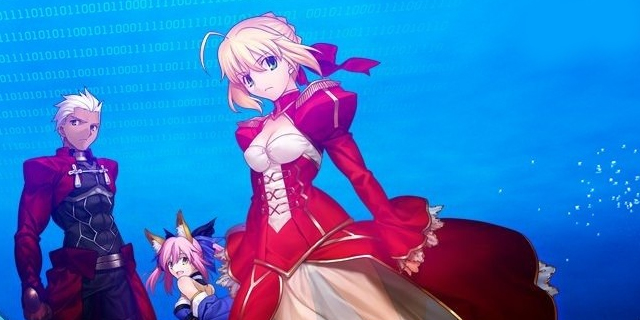
The Fate/Stay Night franchise is somewhat well-known in Japan, but it’s as niche as they come here in the U.S. Despite this, Aksys Games took it upon themselves to localize Fate/Extra, a spinoff RPG aimed at a particularly niche bunch of fans, on a handheld console that isn’t exactly breaking sales records these days. If XSEED ever decides to give up the mantle of bravest publisher in America, we sure know who to pass it on to.
The Fate series revolves around the concept of a Holy Grail War, where magi summon legendary heroic spirits from across time and space as “Servants”, who then fight to the death until only one remains. The Holy Grail then appears, which grants the victor a wish. Extra’s version of this tale takes place in cyberspace, with the war taking a more tournament-like setting in an alternate universe from the main series, despite both sharing a lot of the same characters.
One of the things Fate/Extra has going for it is that, despite being part of a long-running series, you don’t need any previous knowledge of the series to jump right into this one. While there are obvious winks and nudges towards events and characters outside the game, the story itself is self-contained and pretty coherent. Newcomers get a basic rundown on the basics of the Holy Grail War that the entire series is based on, while others instead get introduced to the particulars for this universe.
After going through a prologue that sets the tone for the rest of the game, you select your character’s gender, the game’s difficulty and your Servant. There’s plenty of meaningful choice here, as in addition to the difficulty setting itself, the playstyle and traits for the chosen Servant will greatly affect how you go through the game. Saber is recommended for novice players, as she relies of brute force and will mostly power her way through the game, and Archer has some technicality to his skills. Caster relies on her spells to beat up enemies, but starts with none, making her the hardest character to start with.
You start in investigation phase, when you explore the school setting and find out information about your current opponent in the war, then head into arena dungeon exploration, which is when all the actual fighting takes place. After leaving an arena, a day passes and the cycle repeats until a week goes by. Combat in the game is in a simple rock-paper-scissors style. You input six of these commands in a row, then all are played out at once. This repeats until you or the enemy fall. You’re usually given one hint as to what command the opponent will do, with more being gained as you fight the same enemy again and again and acquire information about them. While different arenas often have recolors of the same enemy (which don’t share the same information), enemy types will often share attack patterns which you can use to predict what commands they’ll use even on a first time meeting with a new enemy. While this style of combat can be a bit luck-based at times, it’s a nice change from the usual turn-based combat and has some depth to it when you include special Servant skill and abilities, as well as Magi spells.
Boss encounters, which occur at the end of every in-game week, are where the game truly shines. Choices done during investigations, as well as events and how much info you could dig up on your opponent, determine the difficulty of the battle itself, from how much damage their extra skills will do to how many of their commands you will see beforehand. So many of the game’s best elements come together during these fights, so it’s a shame they couldn’t make the regular arena fodder as good as the boss fights.
The game’s narrative, penned by original novel author Kinoko Nasu, is incredibly well-done and elaborate. This game is really text-heavy, with tons of in-game dialogue changing according to your character’s gender as well as your chosen Servant. You should save often though, as just like in the original series, in-game choices can and will often lead you to dead ends, which require going back to previous save files and figure out where things went horribly wrong.
In contrast to the narrative, though, the environment isn’t quite as elaborate as one would hope. The entire game takes place inside a virtual school, whose occupants slowly go down in number as the Holy Grail War goes on. Being able to explore the small campus gives some similar vibes from the Persona series, particularly with the way days pass as you play the game, but the exploration isn’t nearly as fleshed-out and you’ll end up just sprinting from relevant NPC A to B once you realize which characters matter and who don’t. Arenas somehow manage to be even worse, as they’re all literally elaborate cube hallways that twist and turn here and there with a pretty, dynamic background. The Arenas really are the game’s low point, as without a plot event to guide you through them, they’re pretty barebones and have nothing going for them.
It’s the climactic boss battles, the pre-encounter investigations, and the game’s clever writing that’ll keep you playing Fate/Extra, particularly when you consider the combinations of characters that entirely change around some of the dialogue in the game. Fate/Extra is still a must play for series fans and those looking for a good RPG that avoids a lot of the now-common RPG design elements, but only those who come to love the game’s plot and atmosphere will end up exploring the game’s full replay value.
Pros: Great plot and characters, fun and varied gameplay, tons of replay value
Cons: Environments are incredibly dull; Combat can be a bit luck-based at times



















